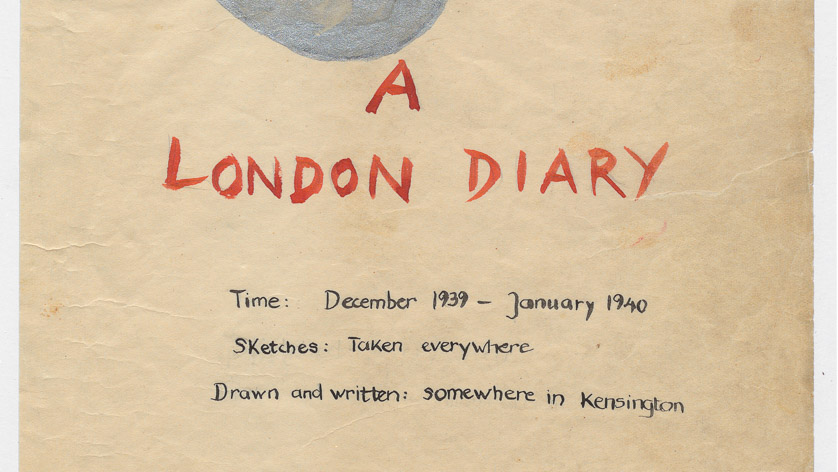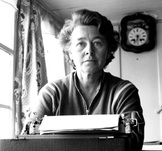“I was still very young and saw the fates of these children every day. It goes without saying that I felt the deepest pity for them [...]. My compassion turned into a profound sense of social guilt. That was the start of my conversion to socialism.” (From: Margarete Buber-Neumann: Von Potsdam nach Moskau: Stationen eines Irrweges [From Potsdam to Moscow: Stations of an Erring Way]. - Stuttgart: Dt. Verl.-Anst., 1957, p. 39f.). In 1920, Margaret met Rafael Buber, son of the Jewish religious philosopher Martin Buber, through the Wandervogel youth movement. That same year, she accompanied him to Heidelberg, where they both joined the Young Communist League of Germany. Her first daughter, Barbara, was born in 1921; her daughter Judith in 1924. The marriage only lasted a few years; Margarete Buber returned to Potsdam in 1925. The couple divorced in 1929. Back in Potsdam, she joined the KPD in 1926, and in 1928 started working as a secretary for the Comintern journal Internationale Pressekorrespondenz. In 1929, she met Heinz Neumann, a leading KPD and Comintern functionary, at the house of her sister Babette Gross. In 1935, after spending time in Spain and Switzerland, she travelled with him to the Soviet Union.
In 1937, while working in Moscow for a Comintern publisher, where he was responsible for translating records of show trials, Neumann himself fell victim to the “Stalinist purge”. In April 1937, he was arrested, sentenced to death and executed. Unaware of her partner's fate – she did not receive official notification of Heinz Neumann's death until a letter from the Red Cross arrived in 1959 – Margarete Buber-Neumann remained alone in Moscow until she was arrested in June 1938. She was sentenced to imprisonment, and in 1939 was sent to the Karaganda camp in Kazakhstan where she was subjected to the rigours of forced labour. After the Hitler-Stalin Pact was signed in August 1939, her prison sentence was commuted to deportation. In February 1940, she and 30 other people were handed over to the “German Reich” on a frontier bridge in Brest-Litovsk, and in August 1940 she was sent to the women's concentration camp in Ravensbrück.
Margarete Buber-Neumann wrote about her painful experiences in works such as her autobiographical report Als Gefangene bei Stalin und Hitler (Under Two Dictators: Prisoner of Stalin and Hitler). While at the women’s concentration camp in Ravensbrück, Margarete Buber-Neumann met Czech journalist Milena Jesenská (1896–1944), who was known far and wide as Franz Kafka's companion and translator. Margarete Buber-Neumann described her close friendship with Milena Jesenská in works such as her biography Kafkas Freundin Milena (Mistress to Kafka), which was published in 1963.
Margarete Buber-Neumann was released from Ravensbrück shortly before the Red Army liberated the camp in April 1945. From the late autumn of 1945 – barring a three-year stay in Sweden – she lived in Frankfurt am Main. Margarete Buber-Neumann became famous for her autobiographical reports and also for her testimony at the Kravchenko process in Paris in 1949. By describing her experiences in a Soviet camp and her deportation to Germany, she became the most important witness to testify in favour of former Soviet arms expert Victor Kravchenko, who had written a book about Stalinist terror while in asylum in the USA and was then accused in a French Communist newspaper of being a liar and a CIA spy.
In the Federal Republic of Germany, Margarete Buber-Neumann became known as a political speaker and publicist whose life's work was to warn people of the dangers of any kind of totalitarian regime. She took part in the Congress for Cultural Freedom in Berlin, directed the “Institut für politische Erziehung” (Institute for Political Education) and the “Befreiungskomitee für die Opfer totalitärer Willkür” (Committee for the Liberation of Victims of Totalitarian Despotism), and edited the journals Die Aktion and Freisein. As an opponent of Willy Brandt’s policy towards the East, she became a member of the short-lived political party “Bund freies Deutschland”. In 1975, she made her position in party politics clear by joining the CDU. Her work was honoured late in life when she was presented with the Federal Cross of Merit in 1981. Margarete Buber-Neumann died in Frankfurt am Main on 6 November 1989.
In 1989, Margarete Buber-Neumann’s daughters Judith Buber-Agassi and Barbara Goldschmidt presented her extensive estate, consisting of around 20,000 items, to the German Exile Archive 1933–1945 at the recommendation of politologist Iring Fetscher. It includes the manuscripts of all her books, the scripts of her television films Max Hölz and Als Gefangene bei Stalin und Hitler, essays and the manuscripts or typescripts of her talks. Her entire postwar correspondence has also been bequeathed to the German Exile Archive and includes letters from Max Brod, Ruth Fischer, Willy Haas, Kurt Hiller, Arthur Koestler and William S. Schlamm together with letters from Ravensbrück and numerous personal documents and photos. The legacy also contains a comprehensive library of works on Eastern European contemporary history and politics.



